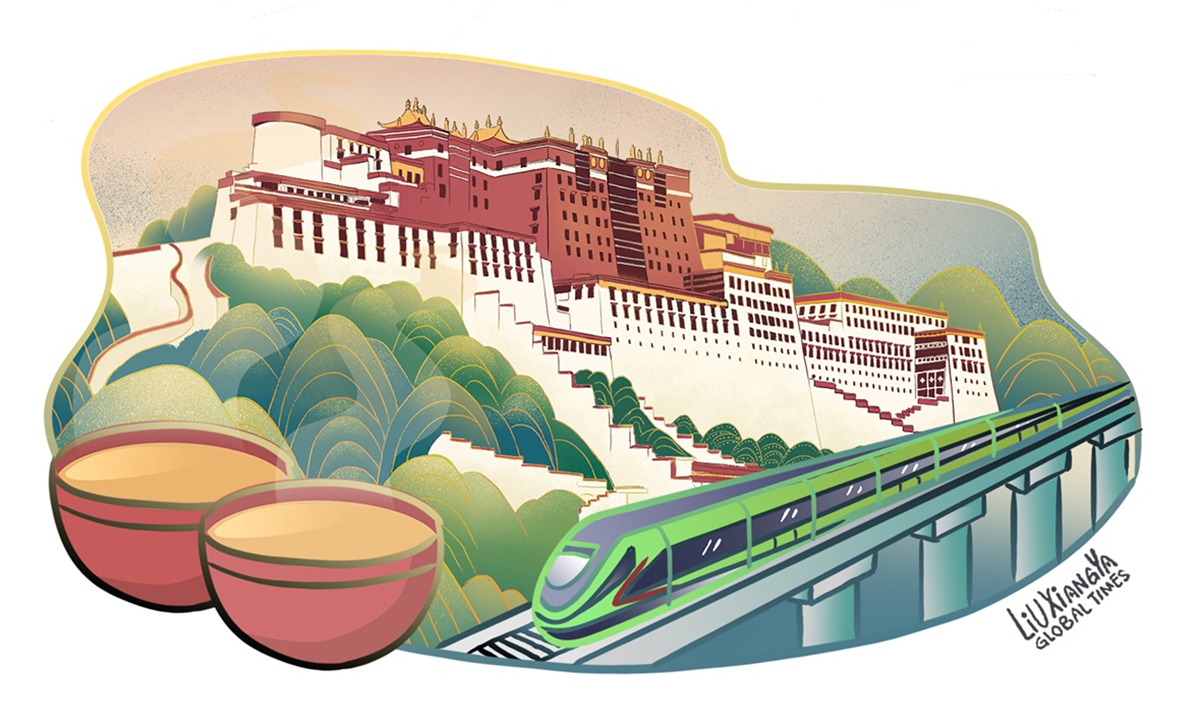
Illustration: Liu Xiangya/Global Times
In the eyes of some Western forces, it seems that backwardness and poverty should be the true feature of Southwest China's Xizang Autonomous Region. With an ulterior motive of hindering China's development, they try to project their colonialist past onto today's China by discrediting China's urbanization process in Xizang. Through a filthy, biased lens, they fail to see the realistic picture of the Tibetans' lives thriving due to the region's development.
In its latest report released on Tuesday, the so-called international human rights organization Human Rights Watch (HRW) said the Chinese government is "using extreme forms of pressure to coerce Tibetans to relocate their long-established villages," saying it's an effort to "assimilate Tibetan schooling, culture, and religion." Several US media used the term "forced urbanization."
It is common to see some Western forces label all positive changes in China with negative interpretations. In the case of Xizang urbanization, it is utter nonsense to portray urbanization as an evil or an encumbrance for the region and the people living there. It is clear that those malicious forces in the West are completely unaware of the current state of Xizang development and the profound impact of this progress on the local people and history.
Flourishing all over the globe, urbanization is bound to happen in the development of human history and society. Anyone who has been to Xizang can see that urbanization has brought enormous tangible advantages to the Tibetan people. It is in the process of urbanization that the productive forces of the region have been developed, and the people in Xizang, including Tibetans, have not only improved the standards of their material life, but also acquired more opportunities to study or work as people in other more developed regions by safeguarding their rights to education.
In general, urbanization is one piece of Xizang's general development achievements that have brought a new outlook to Xizang, enhancing the speed of regional development. China has made it one of its national strategies to accelerate the development of ethnic minority areas, including Xizang. We are very proud of Xizang's achievements and glad to see them happening.
The positive result of such changes can be felt in many spheres. By the end of 2019, Xizang had lifted 628,000 registered poor residents and 74 counties/districts out of poverty. The rate of compulsory education in the whole region has reached 97.78 percent, while Xizang now provides a comprehensive public healthcare system covering regular basic medical services, maternity and childcare, disease prevention and control, and Tibetan medicine and therapies.
In fact, when seeing how more and more Tibetan rural residents embrace elements of urban life and move toward modernization, some Westerners automatically associate it with how the Western colonialists used to treat Asian, African and Latin American countries and peoples centuries ago. However, it is a distortion and slander to equate the improvement of the lives of Chinese rural residents with Western colonialism. And instead of focusing on their own countries' current development issues, these forces turn to their habitual tactic of slandering and attacking China's progress. This is both ridiculous and pathetic.
At the same time, their ill-intended association between urbanization and "cultural assimilation" is also proven untenable. In fact, it is urbanization that has given the ethnic minorities in China a better understanding of the full picture of Chinese culture and promoted interactions and exchanges among different ethnic groups, thus enhancing and consolidating national unity. This is, of course, a good thing in the eyes of the Chinese people. But for some in the West with a colonialist mind-set, the growing unity of the Chinese nation is, for sure, not what they want to see.
HRW has been acting very concerned about Xizang-related issues and has repeatedly bashed China by playing the "Xizang card." Organizations like HRW feed on baseless attacks on China and the erasure of the achievements made by the Chinese people in various aspects, hoping to see China's failure. But it is not the Chinese nation or China that will decline, but those so-called organizations. It is inevitable for them to deal with a disastrous ending.




